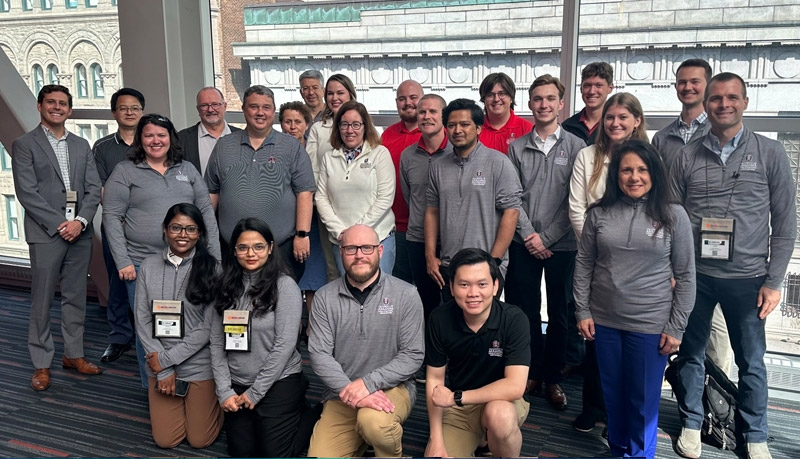Industrial Engineering
Industrial engineers design, analyze and operate systems across a variety of industries.
They possess skills in computing, statistics, economics and project management that
are often applied within interdisciplinary engineering teams. An industrial engineer
has the technical expertise to solve problems and the communication training to use
these solutions to impact business decisions. As an industrial engineer, you could
design warehouses that store goods more efficiently, oversee operations in the aerospace
industry, create system improvements in amusement parks, or lead new product development
at an emerging technology.
The opportunities for an industrial engineer are endless!
Degrees Offered
UG Student to Faculty Ratio
Students Enrolled (2024)
*Includes Online Programs
Number of Degrees Awarded (2023)
Graduate Employment Placement Rate
Average Salary
(BSIEOA Students)
Amount in Active Research Rewards (2023)
Career Outlook
Our personalized approach not only enhances your skills and knowledge but also ensures
that your education is relevant and fulfilling, positioning you for success in your
engineering career.
What You Can Do
- Industrial Engineer
- Quality Engineer
- Operations Analyst
- Project Manager
- Data Scientist
- Consultant
- Supply Chain Manager
- Operations Manager
- Project Manager
- Logisticians
- Operations Research Analyst
- Health Services Manager
- Engineering Manager
- Systems Engineer
Companies Hiring Our Graduates
- Amazon
- American Airlines
- J.B. Hunt Transport
- ArcBest
- John Deere
- Boeing
- Lockheed Martin
- Mastercard
- PepsiCo
- Phillips 66
- Disney
- Sam's Club
- FedEx
- Texas Instruments
- Frito-Lay
- Walmart
- General Motors
Research Areas
Big Data and Data Analytics
Big data analytics uses advanced analytics on large structured and unstructured data collections to produce valuable business insights. It is used widely across industries as varied as health care, education, insurance, artificial intelligence, retail, and manufacturing to understand what’s working and what’s not to improve processes, systems, and profitability.
As organizations recognize the value of leveraging data for informed decision-making
and improved performance, the demand for professionals with expertise in big data
continues to rise.
Our faculty involved in this research:
Reliability, Maintainability, and Quality Engineering
The essence of reliability, maintainability and quality (RM&Q) engineering lies in shaping system design to enhance mission capability and availability while minimizing logistics burdens and costs throughout the system's life cycle. Through meticulous planning, RM&Q engineering mitigates cost and schedule risks by proactively addressing or detecting RM&Q shortcomings in the initial stages of development. This proactive approach fosters improved acquisition efficiency and boosts success rates in operational testing and the overall development process.
Our faculty involved in this research area:
Transportation, Logistics and Distribution
Transportation, Logistics and Distribution engineers play a vital role in ensuring the efficient movement of goods and services from production facilities to consumers. Their responsibilities encompass a wide range of tasks aimed at optimizing transportation networks, streamlining logistical processes, and enhancing distribution channels. These engineers may design and develop transportation systems, such as roads, railways, airports, and ports, with a focus on improving safety, reliability, and sustainability.
They also analyze and optimize supply chain operations, including inventory management, warehousing and order fulfillment, to minimize costs and maximize efficiency. Overall, their work contributes to the smooth functioning of global supply chains and plays a crucial role in facilitating economic growth and development.
Our faculty involved in this area of research:
Healthcare Systems Engineering
Healthcare Systems Engineers apply engineering principles and methodologies to optimize and improve various aspects of healthcare delivery systems. Their role encompasses a wide range of responsibilities aimed at enhancing patient care, operational efficiency and overall healthcare outcomes.
In general, Healthcare Systems Engineers play a crucial role in improving the efficiency, quality, and accessibility of healthcare services, ultimately contributing to better patient outcomes and experiences.
Our faculty involved in this research area:
Engineering Management
Engineering management engineers play a crucial role in overseeing the planning, coordination, and execution of engineering projects and programs within organizations. Their responsibilities encompass a wide range of managerial and technical tasks aimed at ensuring the successful completion of engineering initiatives.
Our faculty involved in this research:
Industrial Engineering Research Labs
Department News

Student Organizations
Join to gain experience, enhance your degree, connect with peers, and make a collective impact.
Contact Us
ineg@uark.edu479-575-3156
4207 Bell Engineering Center
Mailing Address
Department of Industrial Engineering
4207 Bell Engineering Center
1 University of Arkansas
Fayetteville, AR 72701